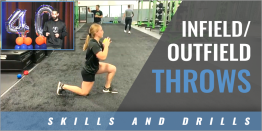| The Anatomy of Unshakable Confidence |
| By: Jen Croneberger - President, JLynne Consulting Group
Provided by: NFCA Across my decades of learning and education, I have spent a significant amount of time studying confidence. To the point that I believe strongly that it is completely in our control. I think we often get confused in thinking others give it to us by the words they say or, in some cases, don't say. We rely on others to make us feel strong and brave and like we can do anything. The truth is if we wait for others to provide us with much needed positive feelings about ourselves, we could be waiting for something that may never come. This isn't to say you can't get confidence boosts from the outside world, but when you are in control of it, you will always have the ability to call on it when you need it the most. Here is a breakdown of how to develop unshakable confidence that you can take to the field, the court, the track and even the next job interview or boardroom. And as I always used to teach my players, if you can control it, you can win it. First, recognize your definition of what confidence is for you. Dictionary.com defines confidence as "a feeling of assurance, especially self-assurance." I learned in my studies that it's more than that, however. It also is very much about how deeply you believe in your ability to perform a certain task or skill. How much you believe in your own ability can change everything. And learning how to do that with solid footing will make sure you never lose confidence again. I have long been taught that confidence comes from two places internally - past performance and preparation. And that is certainly true. And so is the opposite to that. The absence of both of those things can also strip you of confidence as quickly as you saw it appear. So, the key is to focus on the things you can control. Practicing this is easy. Start by making a list of all the things that are outside your control when it comes to confidence. Then make a list of all the things you do control. Focus there. Practice those things by repeating mantras that will remind you of how confident you are and why you have reason to be. This brings me to my next step: Make a confidence resume. Very simply, write down your strengths on a piece of paper. That may sound very simple, but the truth is that is one of the hardest things to do for most people. I have watched grown adults struggle to make that list at all. And when they start it, they often can't even list 10 things. There are many reasons this happens, but one is the fact that we don't often spend time talking about what we are good at. In fact, when we were younger, we were told not to do that. No one loves a braggart. Yet, I think perhaps we have been told this to a fault. We now struggle admitting we are good at things, and we are afraid to do so, because we don't want to look like an arrogant jerk. We also struggle with this because we spend most of our time seeing the negative and all the ways we can improve. Not that those things aren't important to work on, but when we don't ever see the good things, we have a tendency to, over time, think they don't exist. When asked how often pros practice the things they aren't good at versus their strengths, most will tell you it's 50/50. Maybe we need to do the same. Doubts come up. They are like little roadblocks that try to trip you up and keep you from getting to where you want to go. Learning how to squash them quickly will keep your confidence up and your success rate just as high. Re-framing doubts is an easy practice that I have taught everyone from pro athletes to seven-year-olds. It's simple to do, yet hard not to beat yourself up for having to do it in the first place. Be gentle, doubts are normal. Just don't stay there. Routines are another way of making sure your confidence is high going into competition and stays high throughout. As preparation solidifies confidence, these routines are the best way to prepare so that your mind and body are in check, and you are telling yourself you have been here before, so you know you will be OK. This also helps to put out the doubt fires, because your mind can't be thinking about two opposing thoughts at the same time. While I could potentially write a whole book and lecture series on this (coming soon), I will leave you with one last thought: Repeat a mantra that will remind you of the reasons you have to be confident today. And then say it again every time a doubt surfaces or you feel less confident than you would like. You want unshakable confidence? Well, you are in control of that from start to finish. The only thing you can do to potentially fail at this is if you end up not realizing its importance. Those who are the most successful at this are proactive. Don't ever leave it to chance. |







